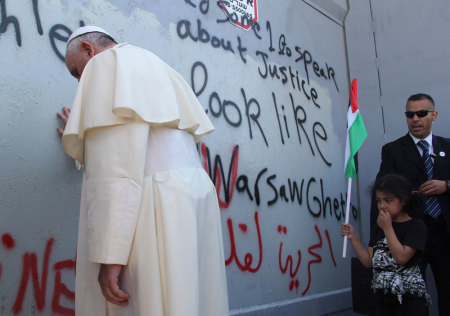Vatican Treaty Officially Recognizes Palestinian State; Israel 'Disappointed' But This Is Nothing New?

The Vatican officially recognized the Palestinian state in a new treaty Wednesday. Israel expressed "disappointment" and accused the Catholic Church of hurting peace prospects in the region.
"Yes, it's a recognition that the state exists," the Vatican spokesman, the Rev. Federico Lombardi, told reporters, according to The Associated Press.
The treaty concerns the Catholic Church's activities in that territory and both parties are expected to sign it soon.
The Israeli Foreign Ministry responded by saying it was "disappointed," explaining that it would not "promote the peace process" but instead distance the Palestinian leadership "from returning to direct and bilateral negotiations."
"Israel will study the agreement and will consider its steps accordingly," it added, according to The Jerusalem Post.
Palestinian President Mahmoud Abbas is scheduled to visit Pope Francis at the Vatican on Sunday.
Even after the U.N. General Assembly recognized a Palestinian state in 2012, the Vatican — under the leadership of Pope Francis' predecessor — welcomed the decision, which was opposed by Israel and the United States. Since then, the Vatican has referred to the territory as "State of Palestine."
There's nothing new in it, writes John L. Allen Jr., associate editor of Crux, which covers the worldwide institution of the Catholic Church. And nor is it about statehood, he argues.
When the Vatican issued a news release in 2013 announcing the onset of negotiations with the Palestinians toward the agreement that's now been finalized, it said the talks would be conducted with "representatives of the Foreign Ministry of the State of Palestine," Allen says, and explains that since the onset of the Israeli/Palestinian conflict, the Vatican has favored a two-state solution, with security guarantees for Israel and self-determination for the Palestinians.
The Vatican is also in favor of a special status for Jerusalem, including protection for the holy sites sacred to the three monotheistic faiths, he adds.
The treaty largely concerns the tax and legal status of Catholic facilities and personnel on the West Bank and Gaza Strip, building on a basic accord reached between the Vatican and the Palestinian Liberation Organization in 2000, Allen explains. "At most, it's a confirmation that the Vatican under Francis is not backing away from a position it had already taken."
During the fighting between Israel and Hamas militants in the Gaza Strip earlier this year, Pope Francis broke off from his scripted weekly Angelus address and said, "Please stop," pleading for peace in the world.
"Brothers and sisters, never war, never war! I am thinking above all of children, who are deprived of the hope of a worthwhile life, of a future," the pontiff said in Saint Peter's Square in February, speaking of the centenary of the World War I.
"I think especially of the children whose hopes for a dignified future are taken from them, dead children, injured and mutilated children, orphans and children who have bits of weapons as toys, children who don't know how to smile," he said.
At a ceremony attended by Israeli President Shimon Peres and Palestinian President Abbas in the Vatican Gardens at the Vatican last June, Francis said God alone can bring peace to the Holy Land and that it is the "evil one" who is blocking it.
"More than once we have been on the verge of peace, but the evil one, employing a variety of means, has succeeded in blocking it," the pope said. "That is why we are here, because we know and we believe that we need the help of God."





















